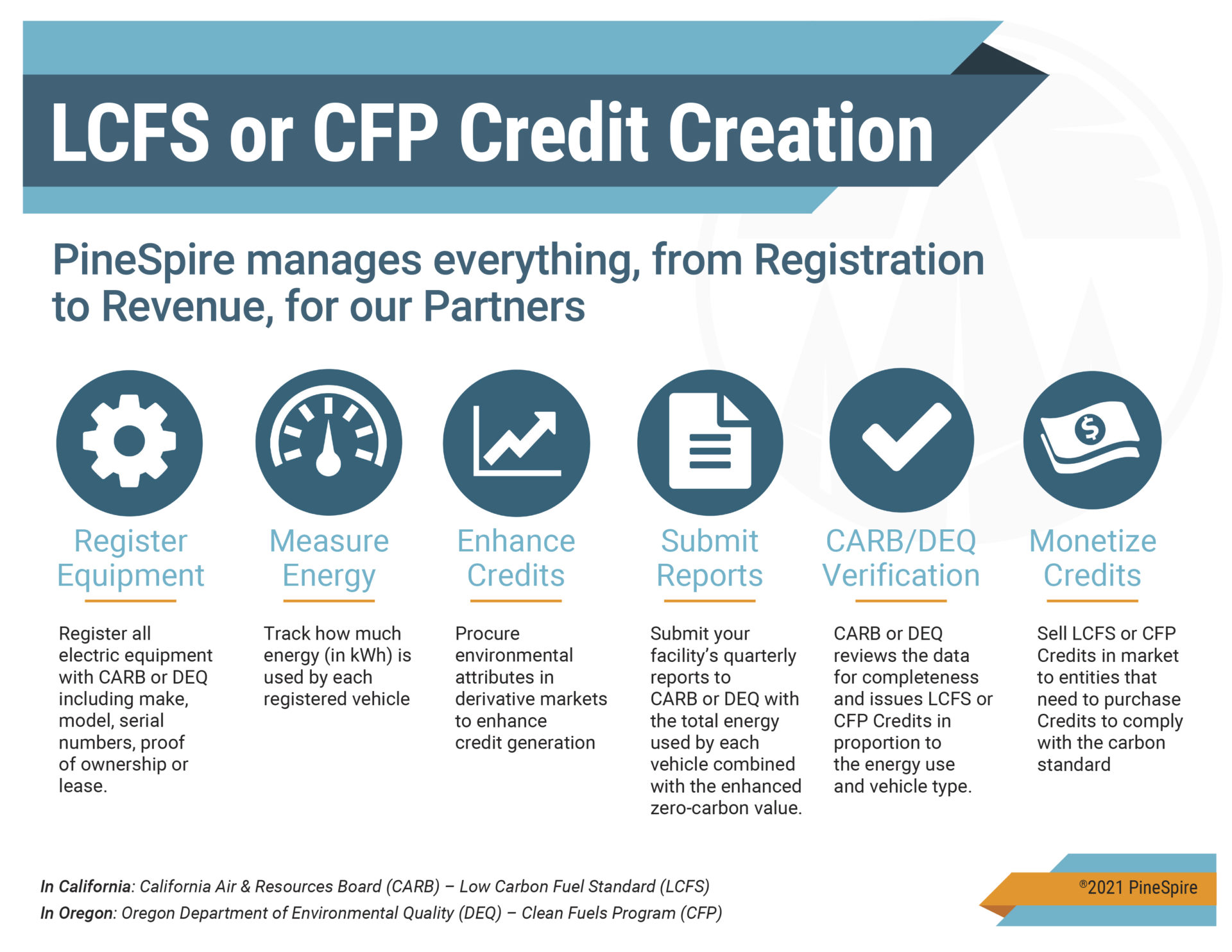Monetize Your EV Fleet with Low Carbon Fuel Standard (LCFS) and Clean Fuels Program (CFP) Credits Managed By PineSpire
Create A New Revenue Stream • Reach Sustainability Goals • Improve Public Health
WIN • WIN • WIN

New Revenue Stream
Start Earning Now!
LCFS and CFP credits can provide a new revenue stream for your existing operations and targeted facilities upgrades. If your municipality owns any electric vehicles, from small parking interceptors to large refuse trucks or public transit, your vehicles are eligible for LCFS and CFP credits. Additionally, any passenger vehicle EV chargers you have installed for the municipal or public use can earn you LCFS and CFP credits. PineSpire will partner with you to ensure all of your eligible equipment is enrolled and you will receive monthly payments from us that can boost your budget and further support your team’s goals.

Reach Sustainability Goals
A Role-Model For Your Community
Not only can PineSpire help ensure that your municipality take full advantage of the California LCFS and Oregon CFP programs to turn your existing or planned assets into revenue generating resources, but by incorporating and promoting Electric Vehicles and Electric Equipment you will lower your municipality’s carbon intensity and encourage your residents to do the same. This shows significant progress and forward-thinking strategies to help meet your Sustainability Goals. By utilizing PineSpire’s expert data and analysis and EV Planning services, Municipalities are able to reach or exceed their public sustainability goals and garner community respect as a leader in sustainability.

Public Health & Air Quality
A Better Environment For Your Citizens
Zero emission vehicles like electric refuse trucks and electric public transit have a real and local impact on air quality in neighborhoods and public areas in your municipality. PineSpire will present you with grant opportunities from state, air district, local and national programs. This grant funding, paired with LCFS and CFP revenue, can bring the cost to go Electric within reach for all budgets and make it a reality for your community and create a better environment for the residents and guests of your neighborhoods.

California’s Low Carbon Fuel Standard (LCFS) program and Oregon’s Clean Fuels Program (CFP) offer electric fleets an additional revenue stream to pay down the cost of electrification. LCFS and CFP credits can be generated directly by fleets charging their own electric equipment, and these credits are turned into revenue to offset electricity costs and reduce total cost of ownership for electrification.
These programs give fleets an opportunity to earn additional revenue by using eligible electric equipment including public and employee charging stations, refuse trucks, vans, buses, forklifts and other cargo handling equipment, yard trucks, and transportation refrigeration units. To see how much you could be earning, Use our INCENTIVE ESTIMATE CALCULATORS.
PineSpire helps clients earn LCFS and CFP credits directly to maximize revenue generation and meet your municipality’s sustainability goals.
PineSpire’s experts understand the complex LCFS and CFP markets, and do the hard work so you can save time while earning additional revenue with your EV program. We manage all aspects of participating in the LCFS and CFP programs from registration to revenue.
Case Studies
PineSpire has compelling case studies to share with you, for example:
Car Chargers Study:
For every 100,000 miles charged, the owner receives over $3,000/year in revenue!
E-Refuse Truck:
Conventional diesel refuse trucks are some of the highest polluters in residential areas. Switching to electric refuse trucks can create incentives of more than $15,000/year per truck.
